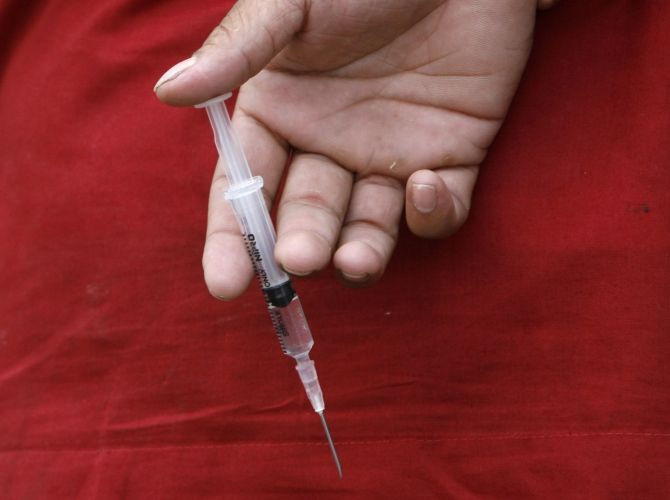Methadone Protects Injected Drug Users From HIV Infection

Methadone reduces risk of HIV infection in people who inject drugs, a new study says.
An estimated 5 to 10 percent of all HIV cases are due to injected drugs, often due to injection of an opiate like heroin. Opiate substitution therapy (OST) offers replacement drugs like methadone or buprenorphine to illicit drug users. The replacement drugs are medications that are given in a supervised clinical setting. These therapies are known to reduce risk of HIV transmission, criminal activity, death from overdose, etc.
"These therapies can reduce HIV transmission among people who inject drugs (PWID) not only in countries in which there is a high incidence of this disease, but also in Quebec where there has been an increase in the use of illicit opiates intravenously, particularly among youths, and where access to OST is problematic," said Julie Bruneau from University of Montreal.
In the present study, researchers analyzed previous research on OST and HIV transmission available from countries like the USA, Canada, UK, Netherland, Austria, Italy, Thailand, Puerto Rico, etc. A total of nine studies were selected for the analysis. The studies were mostly conducted on men aged between 26 and 39 years.
Researchers found that OST reduced the risk of HIV infection by 54 percent. Absolute reduction in HIV risk was difficult to calculate because the study participants had different risk backgrounds. However, researchers found an association between OST use and lower HIV risk.
"There is good evidence to suggest that opiate substitution therapies (OST) reduce drug-related mortality, morbidity and some of the injection risk behaviors among PWID. However, to date there has been no quantitative estimate of the effect of OST in relation to HIV transmission. This new study provides solid evidence demonstrating the link between these treatments and a reduced risk of HIV transmission," said Bruneau.
An estimated 8 percent of people who inject drugs received opiate substitution therapies. The number is even less in developing countries. About 90 percent of people who inject drugs in the U.S. and UK have access to OST while just 3 percent in India and China and zero in the Russian federation have access to these therapies. Another related study published in 2009 had found that countries that have provision for preventive measures like OST and needle and syringe programs have a lower incidence of HIV infection.
"These results are important given that increases in HIV incidence have been reported among PWID in a number of countries in recent years, where opiate substitution therapies are illegal or severely restricted," added Bruneau.



























